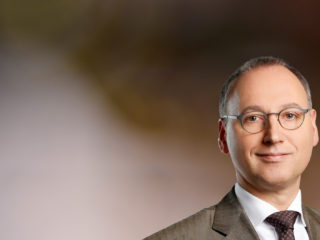
Globalization and competition are not a threat, but a factor of prosperity. Europe must act urgently if it wants to remain a center for innovation.
An essay by Werner Baumann, Chairman of the Board of Management of Bayer AG.
“As for the future, your task is not to foresee it, but to enable it.” Europe should take this astute statement by the writer Antoine de Saint Exupéry to heart. Instead, in the European Union, we too often adopt an attitude that does not enable the future, but hinders it.
An attitude that views globalization and competition not as catalysts and drivers of prosperity, but as threats. That seeks to defend past achievements rather than pursue new opportunities. An attitude that asks “What could go wrong?” instead of “What can we achieve with this?”
This kind of climate does not help innovation thrive and inventors flourish. And as it also poses a risk to our prosperity in Europe, it burdens and challenges our continent. We need a prosperous Europe and we must not jeopardize the successes of European unity.
Europe is deeply skeptical of technological advances. In the “Technik-Radar 2018” survey undertaken in Germany, only one quarter of those surveyed held the opinion that technology solves more problems than it creates.
That helps explain why, more than anywhere else in the world, Europeans have reservations about vaccines, a technology that has contributed enormously to global health. In some European countries, one third of the population doubts the safety of vaccines. On the other end of the spectrum, countries like Bangladesh are home to virtually no vaccination skeptics. This contrast suggests that Europeans have become so accustomed to the blessings of progress that they are less and less appreciative of them.
That’s why people feel they can afford to reject genetic engineering in agriculture. Nearly 70 percent of Germans consider the targeted genetic modification of crops to be risky – although genetically modified plants are verifiably safe for people and the environment.
As a result of this skepticism about technology, Europe is losing ground as a center of innovation and conceding technological progress to others. Make no mistake: The digital future is being written in California. When it comes to artificial intelligence, the next great leap for digitalization, Europe is being left behind by the United States and China.
The situation is no better in another groundbreaking field: CRISPR/Cas and other new breeding technologies. With the help of this advancement, conventional breeding can be supplemented and in some cases replaced by much faster and more precise methods – with identical results. We could breed plants that produce a higher yield, are more resilient in drought conditions, have more valuable nutrients or do not contain certain allergens. These technologies could help feed our growing population and make more efficient use of natural resources. And because the technology is relatively simple and cheap, it would be a valuable asset for mid-sized seed companies and smaller research institutes.
Europe is well-positioned to play a leading role in this field – but a recent decision by the European Court of Justice stands in the way. Last year the court decided that CRISPR/Cas and similar methods must be classified as genetic engineering and regulated according to the same stringent standards. With the stroke of a pen, this promising technology is at risk of being driven abroad. In some cases, it’s already happening. There is no objective reason to so stringently regulate plants bred this way. They do not contain any foreign genes and are no different from traditionally bred plants.
The ball is now in the politicians’ court. It is their task to advance social discourse and create the legal framework that makes it possible to further develop this technology in Europe. Otherwise the message to the rest of the world will once again be that we have no ambitions of playing a role. When it comes to CRISPR/Cas and new breeding methods, others will assume the task of solving future problems. The successful products, growth and jobs of tomorrow will be created elsewhere.
So what needs to happen to ensure that Europe once again becomes a leading, competitive center of innovation? The to-do list ranges from rapidly expanding the digital infrastructure to better financing of children’s daycare, schools and universities. But three things should be at the very top of the agenda.
First: Brexit. The United Kingdom’s withdrawal from the European Union is a major setback for the EU’s innovation capability. After all, the United Kingdom is one of Europe’s most innovative countries, with outstanding universities and research institutes. Among major EU countries, it performs the best in most innovation rankings. The EU needs to strive to achieve the closest possible integration with the United Kingdom in the post-Brexit future – not just economically, but also in science and research.
Second: venture capital. The United States has shown everyone how it’s done. Venture capital is extremely important when it comes to turning scientific findings and ideas into successful companies. Other regions, including Europe, are catching up – but the gap remains significant. Venture capital investment totaled €63.8 billion in the United States in 2017 – in Europe it was €15.6 billion, less than one quarter of that figure. Germany spent only about €1.1 billion in this area. According to one study, 21 of the 50 cities that invest most heavily in start-ups are located in the United States, while 15 are found in Asia and only eight in Europe. There’s only one conclusion to be drawn from these numbers: Europe must do more to ensure that the implementation of promising ideas doesn’t fail for lack of money. That’s why the underlying conditions for raising venture capital in Europe urgently need to be improved.
Through venture capital investment, innovation is generated decentrally from the bottom up and can drive much more progress than governmental efforts. Programs such as “Europe 2020”, the EU growth strategy, and the follow-up program “Horizon Europe” can certainly act as valuable stimuli if they are cleverly designed. But that’s not enough. The speed of innovation found in places like Silicon Valley cannot be orchestrated from Brussels or any other capital city.
Third, and this is the most important point: What Europe needs most is a cultural transformation and a change in mindset. We need to abandon our discouraging fixation on potential risks and move toward a courageous, purposeful culture of opportunities and possibilities.
Of course, it is good and right for technological progress to be accompanied by a comprehensive and critical public debate. And it is important that this debate is reflected in a regulatory framework for technological development that accounts for potential concerns and – where necessary – establishes guidelines.
Yet it is crucial that this public debate is conducted objectively and that regulatory decisions are taken on the basis of sound scientific findings. Unfortunately, we are currently a long way from this ideal in the EU. Debates are emotionally charged and often have little to do with the current state of expertise. This stokes fear. That fear is reflected in restrictive regulations that do not help, but rather hinder, technological advances. An overemphasis on the precautionary principle smothers the greatest opportunities from the outset.
The most important achievement of humanity over the past decades and centuries would likely never have been possible with this attitude. We have escaped from misery. In contrast to the widespread perception that everything is getting worse, today we live in the best world there has ever been. In 1800, average global life expectancy was 31 years – today it is 72. Back then 44 percent of children died before their fifth birthday. Today the figure is just 4 percent. In 1970, 28 percent of the population still suffered from hunger. Today this number is just 11 percent, despite the fact that the world’s population has since increased by more than 3.8 billion.
These statistics could go on and on. They paint a clear picture: That life has improved, and not worsened, in practically all areas. This is a triumph of the Enlightenment, an idea that originally arose in Europe. It placed the potential of people and science on center stage. Europe should orient itself on this idea and maintain this tradition: a Europe of science and technology, a Europe of inventors, a creative experimental laboratory that gave the world the printing press and the piano, the microscope and the steam engine, antibiotics and cars, the airbag and the mp3 player, where the world’s first computer was built.
These figures are not just proof of progress – they also show how much is yet to be done. Wouldn’t it be tremendous to finally achieve victory over diseases such as cancer or Alzheimer’s – just as we did with smallpox, which was eradicated in 1977? Or to eliminate hunger, which still plagues 800 million people around the world? We don’t know whether we will ever be successful in this endeavor because we cannot predict the future. But we can enable it – for more and more people.
The essay is part of the article series “Europe can do better”, which was initiated by United Europe an Handelsblatt. The articles appears in Handelsblatt in German and in German and Englisch on Handelsblatt Online and the website of United Europe until the European Elections. They are also collected in a book which is published on 15 April, 2019 by Herder-Verlag.
About Werner Baumann:
Werner Baumann became Chairman of the Board of Management (CEO) of Bayer AG on May 1, 2016.
He was born in Krefeld, Germany, on October 6, 1962. After studying economics at RWTH Aachen University and the University of Cologne, he joined Bayer in 1988. His first duties were in the Corporate Finance Department in Leverkusen. In 1991 he transferred to Bayer Hispania Comercial in Barcelona, Spain, to take up a position as controller, becoming assistant to the managing director in 1995. One year later, he moved to Bayer Corporation in Tarrytown, New York, latterly heading up the global Business Planning & Administration organization of the Diagnostics Business Group. In July 2002, Baumann returned to Germany to become a member of the Executive Committee and Head of Central Administration & Organization at Bayer HealthCare. In October 2003, he was appointed a member of the Board of Management of the newly formed subgroup Bayer HealthCare AG, also serving as that company’s Labor Director. As a member of the Board of Management and Labor Director of Bayer Schering Pharma AG, Berlin, Germany, from 2006 through September 2009, he actively participated in this company’s integration into the former HealthCare subgroup.
Effective January 1, 2010, Baumann was Chief Financial Officer of Bayer AG. From October 1, 2014, until his appointment as Chairman of the Board of Management, he was Chief Strategy and Portfolio Officer and also responsible for the Europe, Middle East and Africa Region. Between April and the end of December 2015, Baumann was additionally Chairman of the Board of Management of Bayer HealthCare AG.
Werner Baumann is married and has four children.



